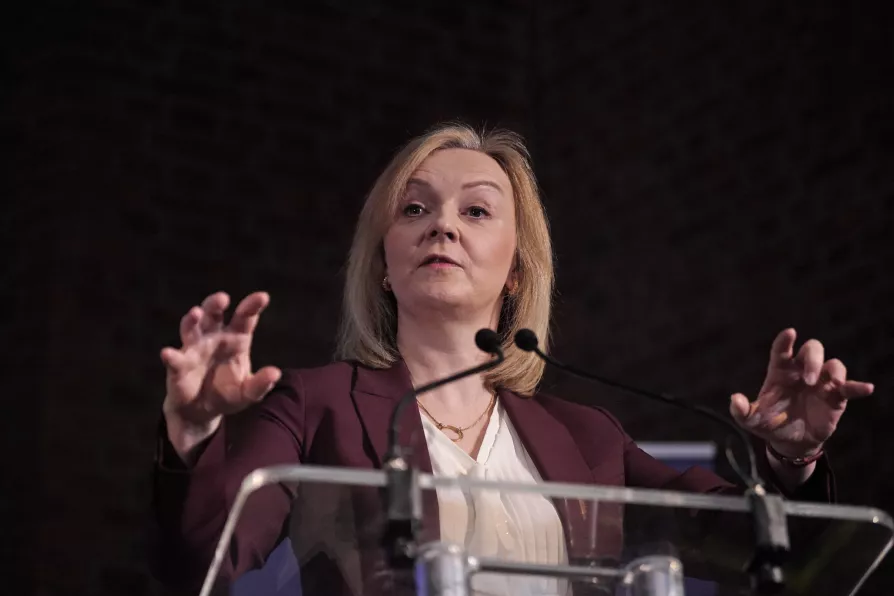
 Former prime minister Liz Truss during the launch of the Popular Conservatism movement at the Emmanuel Centre in central London, in a bid to rally right-wing Tory MPs ahead of a general election this year, February 6, 2024
Former prime minister Liz Truss during the launch of the Popular Conservatism movement at the Emmanuel Centre in central London, in a bid to rally right-wing Tory MPs ahead of a general election this year, February 6, 2024
WE have 10 years to save the West, here today gone tomorrow ex-premier Liz Truss advises in her new book.
Fortunately, it did not take 10 weeks to save Britain from Truss, the brevity of whose time in Downing Street has surely earned her a lasting place in history.
In her own narcissistic telling, her leadership was done in by the “deep state,” including the Civil Service, the Bank of England, the Office for Budget Responsibility and the Financial Times.
She is now touting this theory around the lucrative far-right speakers circuit in the US, urging Donald Trump to learn the lessons from her fate and confront the Establishment if re-elected in November.
It is fair to say that Truss is oblivious to irony. Her political collapse was actually precipitated by the markets by which she swears panicking at her reckless tax-cutting and disregard of conventional economic expertise.
Her complaint is that unelected officials and bureaucrats failed to respect her mandate. In truth, she had none.
She neither won a general election nor even was supported by most Conservative MPs to take over after the Boris Johnson regime imploded.
Truss was named Prime Minister by the unrepresentative and ageing reactionaries constituting the Tory membership, who have a long record of choosing the most right-wing, even unhinged, of the candidates offered to them.
That may have passed for constitutional but it was hardly democratic and it certainly conferred no right for her to listen exclusively to the voices in her own head.
Nevertheless, Truss insists that officialdom should have bent to the decisions of the elected politician and pushed through her reckless strategy without complaint.
There is a further irony here, since it is a cardinal principle of the neoliberalism which Truss artlessly champions, that markets should do their own thing entirely unencumbered by political interference.
That is why neoliberals from Hayek on championed any constitution or institution which blocked or hampered political intervention in the economy.
He was a partisan of the European Union, since it enshrined market principles beyond hope of democratic challenge. And Truss herself was, let’s recall, a remainer — until it became politically toxic for her.
Those principles have largely governed Britain for the last 40-plus years. They informed, for example, the decision by the new Labour government of Blair and Brown to remove interest rates from the judgement of politicians by declaring the Bank of England’s “independence.”
So Truss’s clamour for politicians to take back control is surprising. But she may nonetheless be on to something.
The institutions of the state, be they deep or shallow, exist to ensure the smooth functioning of capitalism, of the accumulation of capital and of the system’s social reproduction.
Generally, this function is wrapped up in a purported “national interest” which transcends the wishes of mere politicians.
We can be sure that had Jeremy Corbyn led a Labour government this reality would have rapidly played out. We can further be sure that Truss would have found nothing objectionable in the unelected thwarting the will of democracy under such circumstances.
However, Truss has done an unintended service if she sheds a spotlight on the role of the state. It reminds us that, at root, capitalism is antithetical to democracy.
That is why, as eminent conservative philosopher Roger Scruton once opined, real Conservatives did not count democracy as a core value.
And that is why the West actually needs saving from the alliance of the Trusses and the Bravermans, the free-market dogmatists and the authoritarians. But that salvation cannot be the work of the state, but of the working-class movement instead.

MARTIN HALL passes time in the sanguine company of a traditional conservative, recalling their disastrous governments

There is no doubt that Trump’s regime is a right-wing one, but the clash between the state apparatus and the national and local government is a good example of what any future left-wing formation will face here in Britain, writes NICK WRIGHT

The Tories’ trouble is rooted in the British capitalist Establishment now being more disoriented and uncertain of its social mission than before, argues ANDREW MURRAY











